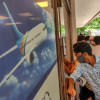When hope turns into despair
When celebrations were underway at the city's Bangabandhu International Convention Centre (BICC) on International Migrants' Day yesterday, Rimon Hossain was waiting at the Dhaka airport for his father to pick him up.
He arrived at the airport at 12:30am after he had been in jail in Malaysia's Malacca for four months, even though he had valid work visas that he secured by spending Tk 3.5 lakh.
He said he and five other Bangladeshis had gone to Malaysia late July this year and were at a market in Malacca, though they were originally hired for a company in Kuala Lumpur. Both the companies were owned by the same family, he said.
“We had worked for only 18 days without pay and then we were detained and kept in an immigration camp for more than four months,” said Rimon Hossain, father of an 11-year old boy, sitting in his Meherpur-bound bus waiting for ferry at Aricha Ferry Ghat in Manikganj around 7:00pm yesterday.
Rimon said he became weak because of poor diet at the camp in Malacca and developed skin diseases all over his body.
“I am worried about my future. How will I be paying off the loans that I had taken from NGOs and cooperatives?” asked Rimon, 32, who financed his migration by leasing out 30 decimals of land, selling a three-wheeler and borrowing money.
“If my broker does not pay me the money back, I will have no other way than to hang myself,” he told this correspondent over the phone.
Rimon said he saw dozens of other Bangladeshis languishing in the detention camps.
“The life in foreign land is very painful. I will never go abroad to work again.”
Rabiul Khalifa of Bakerganj in Barishal too faced the same fate. Both of them returned after their parents from home paid the air ticket fare.
They were part of a total 15 Bangladeshis who returned from detention camps or jails in Malaysia yesterday, he said.
After spending Tk 4 lakh to go to Malaysia, a home to nearly one million Bangladeshis, Rabiul said, “I worked for 12 days but did not get any pay before my detention.”
“The situation in the camp was very bad…I cannot talk anymore,” he said when this correspondent asked about his days at the camp.
According to Prabashi Kallyan Desk at the Hazrat Shahjalal International Airport, 75 female domestic workers returned from different shelter homes run by Bangladesh embassy in Riyadh.
“Their complaints included non-payment of salaries, physical and mental abuses,” said an official at the airport yesterday as the world observed the day with the theme “Migration with Dignity”.
According to the UN, “Treating every migrant with dignity is one of fundamental requirements we face before anything else we attempt on migration”.
The issue is of paramount significance, but the reality is strikingly different as corruption, fraud, and exploitation of migrants are rampant, experts say.
According to the Bureau of Manpower Employment and Training, more than one crore Bangladeshis work abroad and send home yearly $15 billion, which is a lifeline for the country's economy.
When the authorities seem happy with the remittance, the measures to prevent malpractices in labour recruitment are not strong enough, said Mohammad Harun-Al Rashid, a Bangladeshi migrant rights activist in Malaysia.
Since January this year, Malaysia arrested around 7,000 Bangladeshi workers for their irregular status. Many of them told this correspondent they were irregular because of fraudulence by the brokers who were paid hefty sums, and non-payment or low-payment by the employers in the Southeast Asian country.
Many of them are returning after serving jail terms, penniless and facing sheer humiliation.
According to the BMET, over 65,000 Bangladeshis, including more than 1000 women, have returned from different countries since January this year. It does not have separate data on those who faced jail or faced physical, mental or sexual abuses.
“Authorities are doing little to protect migrants,” Harun-Al Rashid told this correspondent yesterday.
Expatriates' Welfare and Overseas Employment Secretary Rownaq Jahan said the government was working to reduce migration cost and control the illegal manpower brokers to ensure safe labour migration.
“The private sector and others involved in the sector should have a more cooperative attitude,” she said at A debate programme organised by Debate for Democracy at the BICC, marking the International Migrants' Day yesterday.
Different international and national NGOs, banks and recruiting agencies participated in the “migration fair” organised by the expatriates' welfare ministry.

 For all latest news, follow The Daily Star's Google News channel.
For all latest news, follow The Daily Star's Google News channel. 








Comments